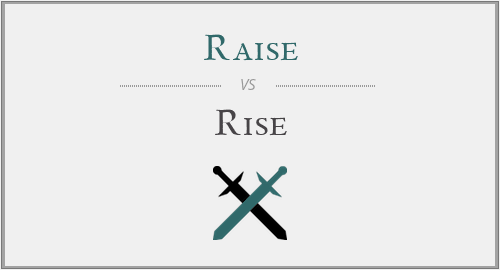Raise
Raise needs an object for reference. This means it is a transitive verb. One can raise funds, raise children, raise voice etc... where funds, children and voice are all objects without which raise will not make any sense. Examples –
· Raise your children to be independent and honest.
· I raised my hand but the speaker couldn’t see me.
· Don’t raise your voice, talk softly.
· Why are you raising your eyebrows? Is the news so surprising?
· You should consider raising the maximum number of applicants to 400.
Note that raise is a regular verb, the three forms are – raise, raised, raised.
Rise
To rise something, there is no external force needed. For example, the sun rises, a person rises beyond his own capacity etc… Rise is thus an intransitive verb and is also irregular with its forms – rise, rose, risen. Rise originated from ‘risan’ of Germanic origin, that means to ‘wake’.
Rise can be used both as a verb and noun.
Examples –
· The children rose from their seats when the principal arrived.
· The rise in prices are a result of less supply.
· Early to rise and early to sleep is a habit that can make you successful.
· She has risen up the career ladder quite fast.
Very often, the two words can be confused because the meanings are quite similar. Let us use both the words in some examples to understand the difference clearly.
· The company asked its directors to rise above the differences and raise the standard of work culture.
· Would you raise our salaries because of the 4% rise in profit?
· The rise of urban population has led to the raise in construction of high-rise buildings.

· The raise they gave is not enough as the expenses are on the rise.
· We need to raise more funds to help the company rise to top 3.
· Raise the coolness of AC as the outside temperature has risen to 40 degrees Celsius.
The simple way to remember is –
ü Use raise when the subject is immediately followed by the object – hand, children, building, ceiling height, funds, standard and so on. In general, raise X, raise a/an/the X where X is the object.
ü Use rise when the subject does not need an object.
o The company recently raised the price of its products. (object = product price)
o The prices rose to a steeping high recently. (no object)
You can use adverbs with rise – sharp rise, high rise, steep rise etc…
How about a salary rise/raise?
Nothing complex here. In British English, an increase in salary is called pay “rise”
whereas
in American English, it is called as a pay “raise”.
Check it out yourself
The above information may seem overwhelming, but the examples are good enough to help you grasp the core concept. Check if you are able to answer the following –
ü Following the sudden temperature _____ in the city, the government declared holiday for schools.
ü Huge ____ in unemployment was the main reason of ___ in the number of suicides.
ü To ____ the bar of its services, the company offered personalised customer service to platinum members.




Have a discussion about this article with the community:
Report Comment
We're doing our best to make sure our content is useful, accurate and safe.
If by any chance you spot an inappropriate comment while navigating through our website please use this form to let us know, and we'll take care of it shortly.
Attachment
You need to be logged in to favorite.
Log In